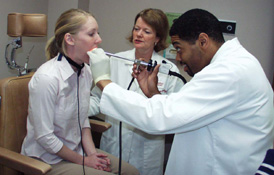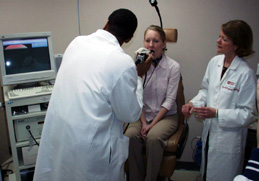 |
Brynn Richardson, a post-doc research associate, helps Marsha Sullivan and Steve Sims, M.D., demonstrate how voice problems are detected in the Professional Voice Center. |
Steven Sims, M.D., assistant professor in the department of otolaryngology — head and neck surgery at UNMC, hopes to help people realize that caring for their voice is just like the conditioning of runners preparing for the Boston Marathon — a warm-up routine is recommended to prevent injury.
Conditioning your voice
 |
Steve Sims, M.D., uses computerized voice analysis equipment to help diagnose vocal disorders. |
“Singing, or talking for extended periods, is like an athletic exercise,” Dr. Sims said. “You wouldn’t run a marathon without first being in condition to do so. Likewise, your vocal cords have to be in condition and need plenty of rest. You also need to drink lots of water and should always prepare by warming-up with vocal exercises.
“Many people don’t think about their voice as something that can be damaged due to overuse,” Dr. Sims said. “But if it’s not used properly or given enough rest, many serious problems can develop.”
Singer praises Professional Voice Center
Omaha’s Ruth Wassom has experienced the type of problems that can occur when the voice is not treated with care. Wassom, a member of the Omaha Symphonic Chorus since 1975 and a teacher at Field Club Elementary, recently lost part of her vocal range due to a vascular polyp which developed on her vocal cords. After having the polyp surgically removed by Dr. Sims in February 2002, Wassom has worked with Dr. Sims and Marsha Sullivan, a speech pathologist at UNMC’s Munroe-Meyer Institute, to restore and even improve her vocal capabilities.
“I can’t say enough great things about them,” said Wassom, who often utilizes music as a means of teaching English as a second language to pre-kindergarten students. “They’ve given me pointers on what to do and we’ve worked on vocal exercises to the point where my upper range is now better than it was prior to the surgery.”
Wassom points out that she is now able to hit a note of high C, which she was unable to do prior to her diagnosis and subsequent operation.
Professions susceptible to voice problems
Wassom’s dual role as a teacher and singer made her very susceptible to experiencing hoarseness, which was a primary symptom of her disorder. But Dr. Sims said it’s not just singers who need to be aware of how to care for their voice. Teachers, newscasters, attorneys, pastors, politicians, telemarketers or others whose profession calls for extended use of speech should consider having their vocal usage analyzed at the voice center.
Setting guidelines
With a significant number of telemarketing companies in Omaha, Dr. Sims also is conducting a study that he hopes will establish a set of objective guidelines for workers in that industry or others similar to it.
“People who make telephone calls for a living call in sick all the time due to voice disorders,” Dr. Sims said. “So we hope to establish guidelines which could be presented to the Occupational Safety & Health Administration (OSHA) in order to protect those workers from future problems. This will be a positive step for companies to take, as it will help to make their workers more productive and less apt to miss days of work.”
Dr. Sims’ study will involve nurses at UNMC’s call center, as well as telemarketers with the Gallup Organization and Marriott.
For more information
The Professional Voice Center is located in the ENT Clinic on the second floor of the Durham Outpatient Center. For more information or to schedule an appointment, call 559-5208.